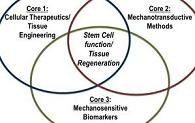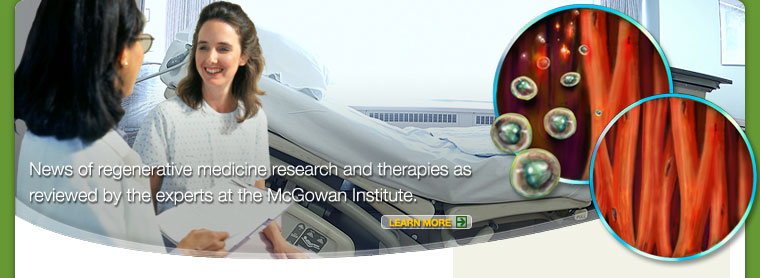Grant Received for the Alliance for Regenerative Rehabilitation Research & Training
The overarching goal of the project is to establish a national network that will expand scientific knowledge, expertise, and methodologies across the domains of regenerative medicine and rehabilitation.

McGowan Institute for Regenerative Medicine
affiliated faculty members Michael Boninger, MD, UPMC Endowed Chair and Professor with Tenure in the Department of Physical Medicine & Rehabilitation, University of Pittsburgh, and Thomas Rando, MD, PhD, Professor, Department of Neurology and Neurological Sciences, Stanford University School of Medicine, are the principal investigators of the recently awarded $1,124,000, 5-year grant from the National Institutes of Health, Eunice Kennedy Shriver National Institute of Child Health & Human Development. The overarching goal of the project entitled, “Alliance for Regenerative Rehabilitation Research & Training (AR3T),” is to establish a national network that will expand scientific knowledge, expertise, and methodologies across the domains of regenerative medicine and rehabilitation.
The project team includes a multidisciplinary group of investigators that brings leadership and vision across the domains of rehabilitation and regenerative medicine. Dr. Boninger has long focused on the integration of innovative technologies into rehabilitation practice, as evidenced by his pioneering work in robotics, bioengineering, and neuroprosthetics. Dr. Rando’s seminal basic science investigations have transformed our understanding of the basic biology of stem cells and tissue regeneration. McGowan Institute for Regenerative Medicine affiliated faculty member Fabrisia Ambrosio, PhD, MPT, Assistant Professor in the Department of Physical Medicine & Rehabilitation,University of Pittsburgh, Linda Noble-Haeusslein, PhD (University of California, San Francisco), Carmen Terzic, MD, PhD (Mayo Clinic), and Gwendolyn Sowa, MD, PhD (University of Pittsburgh), will serve as co-investigators, offering complementary expertise and leadership in musculoskeletal, neurological, and cardiovascular research. Together, these five investigators have a strong track record of successful collaborative efforts dedicated to advancing the field of Regenerative Rehabilitation.
The advancement of regenerative medicine principles and technologies holds great potential to drive progress in the prevention and treatment of individuals with a host of pathologies resulting from injury, disease, or aging. The long-term goal of regenerative medicine is to promote the repair, replacement, or regeneration of tissues. Likewise, rehabilitation seeks to harness the body’s innate regenerative potential in order to maximize function. Both fields hold great potential to drive progress in the treatment of a host of acute and chronic pathologies. The team proposes that these two fields are inextricably intertwined; an intersection of disciplines known as Regenerative Rehabilitation. To fully realize the tremendous potential of Regenerative Rehabilitation, promoting the interaction of basic scientists with rehabilitation specialists must be realized. Rehabilitation clinicians who can help oversee the quality, safety, and validity of these innovative Regenerative Rehabilitation technologies must also be trained.
Toward this end, AR3T will provide didactic training that exposes rehabilitation researchers to cutting-edge investigations and state-of-the-art technologies in the field of regenerative medicine. AR3T will drive the science underlying Regenerative Rehabilitation by:
Illustration: Alliance for Regenerative Rehabilitation Research & Training (AR3T).
Read more…
Bio: Dr. Michael Boninger
Bio: Dr. Thomas Rando
Bio: Dr. Fabrisia Ambrosio
The project team includes a multidisciplinary group of investigators that brings leadership and vision across the domains of rehabilitation and regenerative medicine. Dr. Boninger has long focused on the integration of innovative technologies into rehabilitation practice, as evidenced by his pioneering work in robotics, bioengineering, and neuroprosthetics. Dr. Rando’s seminal basic science investigations have transformed our understanding of the basic biology of stem cells and tissue regeneration. McGowan Institute for Regenerative Medicine affiliated faculty member Fabrisia Ambrosio, PhD, MPT, Assistant Professor in the Department of Physical Medicine & Rehabilitation,University of Pittsburgh, Linda Noble-Haeusslein, PhD (University of California, San Francisco), Carmen Terzic, MD, PhD (Mayo Clinic), and Gwendolyn Sowa, MD, PhD (University of Pittsburgh), will serve as co-investigators, offering complementary expertise and leadership in musculoskeletal, neurological, and cardiovascular research. Together, these five investigators have a strong track record of successful collaborative efforts dedicated to advancing the field of Regenerative Rehabilitation.
The advancement of regenerative medicine principles and technologies holds great potential to drive progress in the prevention and treatment of individuals with a host of pathologies resulting from injury, disease, or aging. The long-term goal of regenerative medicine is to promote the repair, replacement, or regeneration of tissues. Likewise, rehabilitation seeks to harness the body’s innate regenerative potential in order to maximize function. Both fields hold great potential to drive progress in the treatment of a host of acute and chronic pathologies. The team proposes that these two fields are inextricably intertwined; an intersection of disciplines known as Regenerative Rehabilitation. To fully realize the tremendous potential of Regenerative Rehabilitation, promoting the interaction of basic scientists with rehabilitation specialists must be realized. Rehabilitation clinicians who can help oversee the quality, safety, and validity of these innovative Regenerative Rehabilitation technologies must also be trained.
Toward this end, AR3T will provide didactic training that exposes rehabilitation researchers to cutting-edge investigations and state-of-the-art technologies in the field of regenerative medicine. AR3T will drive the science underlying Regenerative Rehabilitation by:
- cultivating collaborative opportunities among rehabilitation researchers and internationally renowned investigators in the field of regenerative medicine
- launching a pilot funding program to support novel lines of Regenerative Rehabilitation investigations
- developing and validating technologies to elucidate the stem cell response to extrinsic mechanical signals
Illustration: Alliance for Regenerative Rehabilitation Research & Training (AR3T).
Read more…
Bio: Dr. Michael Boninger
Bio: Dr. Thomas Rando
Bio: Dr. Fabrisia Ambrosio
